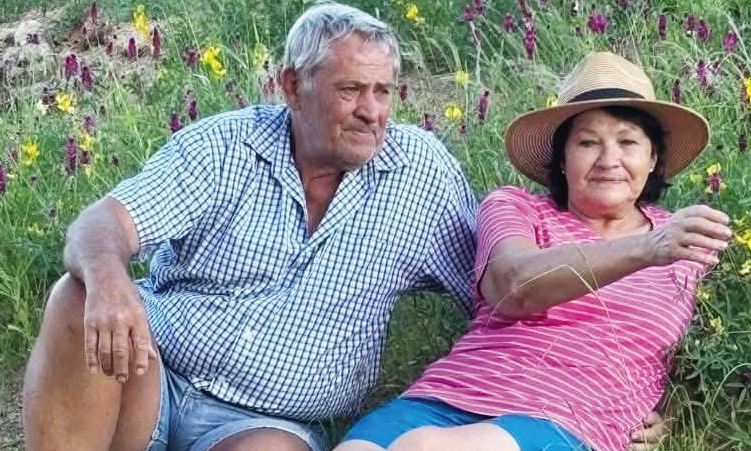THE road to hell is paved with good intentions – and beware of the salesman who arrives with little more than religious references, as a number of leading Namibian businesspeople and public officials have now discovered to their cost.
In a case that lays bare the shortcomings of Namibia’s archaic trust laws, Aranos farmer Eddie Herbert is taking the former trustees of the Esperanza Trust to court for an unsecured N$1 million loan he had advanced to trust founder Peet Britz.The Esperanza Trust, set up by South African Peet Britz in September 2002, purportedly was to provide assistance and counselling to vulnerable children orphaned by the HIV-AIDS pandemic.The trustees count among Namibia’s leading business and political figures: Deputy Finance Minister Tjereko Tweya, businessmen John Nauta, Flip Bredenhann and Wolf Ritter, Master of the High Court Elsie Beukes, Namibian Ambassador to Cuba Grace Uushona, as well as Swapo MP Fluksman Samuel.Britz appeared to have convinced or enticed trustees to sign on with a mixture of devout dedication to children and offers to pay trustees for their time, judging by some of the correspondence seen by The Namibian. Britz also promised commissions to people who recruited new investors while ‘guaranteeing’ earlier deposits taken from the same people.The Esperanza Trust however proved to be little more than an elaborate pyramid scheme: the seemingly devout Britz had convinced several people to ‘lend’ his trust large sums of money at interest rates of between 20 and 25 per cent. This money was to be repaid when ‘the German government’ would match the N$2,5 million he told his victims he needed with N$15 million in donor funds. Needless to say, this never happened – and Britz died suddenly in January 2004, after having swindled at least 13 people out of a total of N$1,162 million.Although the trust deed specifies that no trustee would be held liable for losses incurred by Esperanza, the legal obligations and duties imposed by Namibia’s archaic Trust Moneys Protection Act 34 of 1934 – arguably entitles Herbert to sue the trustees, should he be able to prove in court that they have been negligent in this respect.Herbert is now hoping to recover N$1 million (plus interest of N$45 000 promised by Britz) he said he lent to Esperanza from the former trustees and the Government. A previous attempt in 2006 to obtain a summary judgment against them did not succeed.It is, however, a long shot: a perusal of document submitted showed Britz was by all accounts a financial delinquent, having ‘bought’ a smallholding outside Windhoek, as well as a complex in Windhoek for a total of about N$3,7 million – by passing off rubber checks. An affidavit submitted by Bredenhann in this regard stated that after he realised that Britz was ‘a man of straw’, he abandoned all attempts to recover N$180 000 for buildings erected for a ‘youth centre’ on the smallholding. The owner of the smallholding Bellerode was also bankrupted by Britz’s fraud, Bredenhann said.A perusal of records of Esperanza’s trust account with Bank Windhoek – in which seemingly most of the money was deposited – showed that Britz had spent N$194 600 on office and computer equipment. The balance appeared to have been spent on generous salaries: one Esperanza employee, a certain R.J. Andrew, received over N$116 000 between May and August 2003. Britz however only paid himself a nominal salary of N$5 000 per month, bank records showed.Britz also paid for one of his employees’ wedding dress – N$10 000 paid to Die Bruid – as well as what Herbert claims was N$13 000 paid for the moving of one of the trustees’ household goods.Over N$100 000 was also spent on two insurance policies held with Old Mutual in the six months before his death – raising the question who the ultimate beneficiary of these policies were. But Britz’s estate was never filed in the local High Court – a fact that made it impossible for her to ascertain where the money went, Master of the High Court (and former trustee) Elsie Beukes said in one answering affidavit. Efforts to locate the same in South Africa also drew a blank, seemingly because Britz’s assets were less than R125 000, meaning no final account would be filed with the Master of the Court of the Cape of Good Hope.All the trustees resigned – some earlier than others as in the case with Bredenhann after he had a blazing row with Britz after defrauded out of N$180 000, he stated – but Britz seemed to have kept on recruiting brass-plate names to give his trust credibility.No financial records appeared to have been kept by Esperanza, and by the time alarm bells started ringing and Beukes insisted on an audit before resigning, auditors Hamilton & Partners had not seen any documentation yet from Britz in this regard. They also promptly resigned after alarm was raised by Namfisa.Apart from one trustee meeting on 18 February 2003 – during which Britz bamboozled his trustees into changing from Standard Bank (who closed his account for passing fraudulent cheques to the value of N$3,7 million) to Bank Windhoek, no subsequent trustee meeting was ever held, according to available documentation.The case however does lay bare the massive shortcomings in the Namibian administration of trusts: with only five legal officers, the Master of the High Court office is clearly not equipped to deal the administrative burden of overseeing the about 5 200 registered trusts.No regulations appear to exist in forcing trustees to hold regular meetings, or report outcome of such meetings regularly and within a specified time frame. Failure to protect trust assets is punishable by a slap on the wrist, as the original fine amounts to £100 or three months’ imprisonment.Herbert’s only chance appears to be prove negligence on the side of the State: no law to specify the state’s responsibilities in respect of safeguarding monies held in trust has been passed since Independence. Pyramid schemes explained• JOHN GROBLERWHAT is a pyramid scheme, and how does one spot one before you lose all your money to it?A pyramid scheme – also known as a Ponzi scheme – uses money obtained from later investors to repay earlier investors, usually at rates of return higher than what your bank would offer for fixed, long-term deposits. Pyramid schemes come in various forms, and usually rely on a mixture of gullibility and greed on the part of the victims to suck them into the scheme by promising returns on investment that no one else can or will offer.Attracting new ‘investors’ is crucial: the most common way of recruiting new victims is to offer previous ‘investors’ a commission on whatever new funds can be generated.Funds deposited with the promoter are nearly always ‘commingled’ – in other words, no separate accounts are kept of individual accounts, with all money going into one pot from which the ‘returns’ are then paid out.The promoter usually offers a ‘big score’ at the end of the road, by offering a ‘special deal, just for you’ as long as you leave the money with the promoter. This allows the pyramid operator to dissipate the funds before the authorities can be alerted, as well as tie the ‘investor’ up in promises that will never be honoured.
Stay informed with The Namibian – your source for credible journalism. Get in-depth reporting and opinions for
only N$85 a month. Invest in journalism, invest in democracy –
Subscribe Now!










